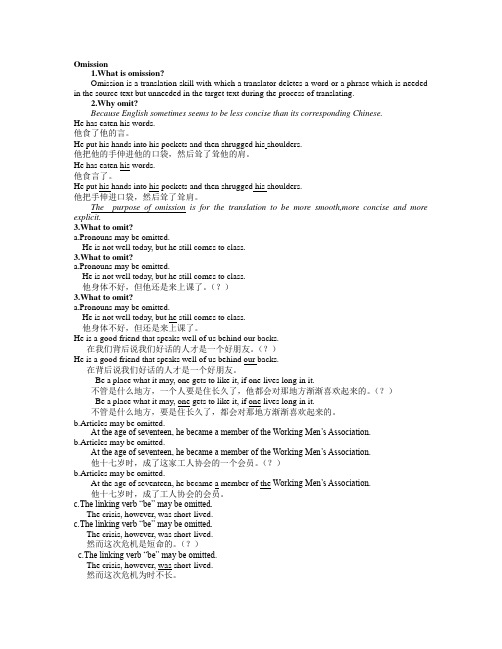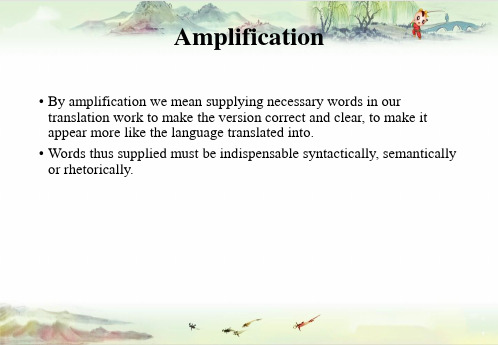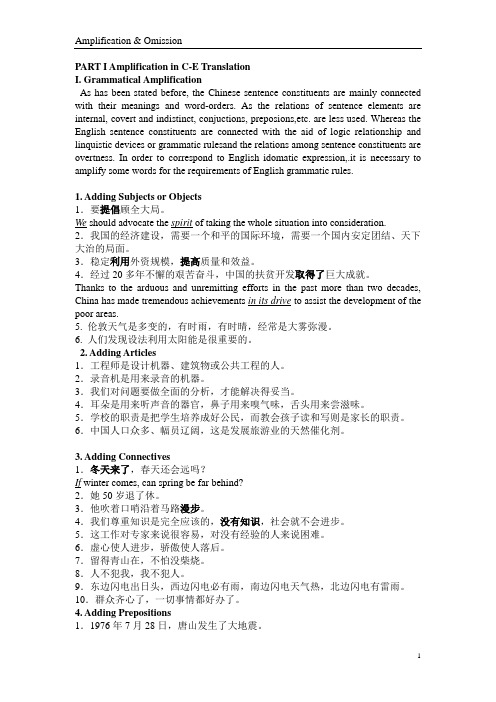amplication and omission 翻译与实践
英译汉

Omission1.What is omission?Omission is a translation skill with which a translator deletes a word or a phrase which is needed in the source text but unneeded in the target text during the process of translating.2.Why omit?Because English sometimes seems to be less concise than its corresponding Chinese.He has eaten his words.他食了他的言。
He put his hands into his pockets and then shrugged his shoulders.他把他的手伸进他的口袋,然后耸了耸他的肩。
He has eaten his words.他食言了。
He put his hands into his pockets and then shrugged his shoulders.他把手伸进口袋,然后耸了耸肩。
The purpose of omission is for the translation to be more smooth,more concise and more explicit.3.What to omit?a.Pronouns may be omitted.He is not well today, but he still comes to class.3.What to omit?a.Pronouns may be omitted.He is not well today, but he still comes to class.他身体不好,但他还是来上课了。
Omission

From the Grammatical Aspect
一、Omission of pronoun 1.省略作主语的人称代词 (1) 根据汉语习惯,前句出现一个主语,后 句如仍为同一主语,就不必重复出现。英 语中通常每句都有主语,因此人称代词做 主语往往多次出现,这种人称代词汉译时 常常可以省略。但省去的人称代词在意思 上仍明显地包含在译文里。
Her dark hair waved untidy across her broad forehead, her face was short, her upper lip short, showing a glint of teeth, her brows were straight and dark, her lashes long and dark, her nose straight. 她的黑发蓬蓬松松地飘拂在前额上,脸是 短短的,上唇也是短短的,露出一排闪亮 的牙齿,眉毛又直又黑,睫毛又长又黑, 鼻子笔直。
4.省略物主代词
在英语句子里的物主代词,出现的频率很高。一 个句子中往往会出现好几个物主代词,如果将每 个物主代词都翻译出来那么汉语译文就显得非常 罗嗦。所以在没有其他人称的物主代词出现的情 况下,在翻译的时候物主代词大多省略。 例如: I wash my hands before having my lunch. 汉语只需说“我吃午餐前洗手”,而不必说“我 吃我的午餐前洗我的手”。
Why do we feel cooler when we fan ourselves? 扇扇子时为什么会感到凉快些? He put his hands into his pockets and then shrugged his shoulders. 他将双手放进衣袋,然后耸了耸肩。
【大学 笔译精品】4.2_amplification_and_omission(1)

(又是)上菜啊, (又是)切面包啊, (又是) 说啊, (又是)笑啊, (又是)敬酒啊,忙个不 停。(增加语气助词和概括词语)
增译法/增词法
• 英汉两种语言由于表达方式不尽相同,翻译时常常 有必要在译文的词量上作适当的增加,使译文既能 忠实地传达原文的内容和风格,又能符合译入语的 表达习惯。但是增词必须是根据具体情况增加非增 加不可的词语。增词一般用于以下三种情况:
• 失踪事件接二连三地发生,显然越来越频繁。
• Conjunctions & articles: • 虚心使人进步,骄傲使人落后。
• Modesty helps one to go forward, whereas conceit makes one lag behind.
• 留得青山在,不怕没柴烧。
the place nor the time for a lecture or an argument. • 我真替她万分担忧,但此时此地既不宜教训她一番,
也不宜与她争论一通。
• Tense markers:
• English prose is elaborate rather than simple. It was not always so.
• 现今英国散文华巧而欠简朴,过去却并非总是如此。 • I had imagined it to be merely a gesture of affection,
but it seems it is to smell the lamb and make sure that it is her own… • 原来我以为这不过是一种亲热的表示,但是现在 看来,这是为了闻一闻羊羔的味道,来断定是不 是自己生的。
Omission省略翻译法的运用课件

• Omission of the pronoun in comparative sentence • The climate in Switzerland is absolutely different from that in Somalia. • 瑞士的气候与索马里截然不同。
Omission省略翻译法的运用
• 她的黑发蓬蓬松松地飘拂在前额上,脸是短短的,上唇也是短短 的,露出一排闪亮的牙齿,眉毛又直又黑,睫毛又长又黑,鼻子 笔直。
Omission省略翻译法的运用
• In order to survive, to feed, clothe and shelter himself and his children, man is engaged in a constant struggle with nature.
Omission省略翻译法的运用
• 连着两星期他都在观察房子的情况,检查各个房间,查看线路、 通道和花园的布局。
Omission省略翻译法的运用
• Her dark hair waved untidy across her broad forehead, her face was short, her upper lip short, showing a glint of teeth, her brows were straight and dark, her lashes long and dark, her nose straight.
his shoulders. • 他将双手放进衣袋,然后耸了耸肩。
Omission省略翻译法的运用
• For two weeks, he had been studying the house, looking at its rooms, its electric wiring, its path and its garden.
12-Amplification & Omission(a)

PART I Amplification in C-E TranslationI. Grammatical AmplificationAs has been stated before, the Chinese sentence constituents are mainly connected with their meanings and word-orders. As the relations of sentence elements are internal, covert and indistinct, conjuctions, preposions,etc. are less used. Whereas the English sentence constituents are connected with the aid of logic relationship and linquistic devices or grammatic rulesand the relations among sentence constituents are overtness. In order to correspond to English idomatic expression,.it is necessary to amplify some words for the requirements of English grammatic rules.1. Adding Subjects or Objects1.要提倡顾全大局。
We should advocate the spirit of taking the whole situation into consideration.2.我国的经济建设,需要一个和平的国际环境,需要一个国内安定团结、天下大治的局面。
3.稳定利用外资规模,提高质量和效益。
翻译基础6 词和省略

2) My father is cooking, but my mother watching TV. • 我爸爸在煮饭,而妈妈 正 看电视。
3) I knew it quite well as I know it now. • 我当时(过去)就跟现在一样清楚。
• 这真是物Biblioteka 价廉,你不买会后悔的。2) She was walking in the street alone, weary and ragged.
• 她独自一人走在大街上 , 面容 憔悴, 衣衫 烂篓。
3) She is extroverted, smiling all the day. • 她 性格 开朗,整天 面 带笑容。
根据意义或修辞上的需要以及惯用法的需要, 增译的情况可以概括为以下12种:
1. Adding verbs
• 英语中重复用词的情况较少,而汉语有时为了达到一定的 修辞效果,经常使用重叠或排比句,翻译成汉语时需要在 名词前增加动词。
• 1) In the evening, after the banquets , the concerts and the table tennis exhibitions , he would work on the drafting of the final communiqué.
• 3)As he sat down and began talking, words pour out. • 他一坐下来就讲开了,滔滔不绝地讲个没完。
4. Adding nouns.
4.1 在不及物动词后增加名词 由于英语中有及物动词和不及物动词之分,有时宾语隐藏在 动词后面,翻译成汉语时需要把宾语补充出来。
笔译
Translation skill 2: amplification/addition & omission●amplification/addition ---supplying necessary words on the basis of accuratecomprehension of the original.●Omission–subtract( vt. 减去;扣掉superfluous adj. 多余的;不必要的;[废]奢侈的)meaning from the original.? The best conductor has the least resistance and the poorest the greatest.最好的导体电阻最小,最差的导体电阻最大。
? The mountains began to throw their long blue shadows over the valley.群山开始向山谷投下一道道蔚蓝色长影。
? Heated, water will change into vapor.水如受热,就会汽化。
? 虚心使人进步,骄傲使人落后。
modesty helps one go forward, whereas conceit makes one lag behind.? 三个臭皮匠,赛过诸葛亮。
Three cobblers with wits combined equal Zhuge liang the master mind.Supply words to make an abstract concept clear? He was moved by Mike’s story and impressed by his dedic ation.? He was described as impressed by your flexibility.? Use abstract instead of concreteUse abstract instead of concrete? 让我们谈谈文艺问题Let’s talk about literature and arts.? 根据科学家的看法,According to scientists,….For the rhetoric (n. 修辞,修辞学;华丽的词藻adj. 花言巧语的)requirement? Women screamed, kids howled, but the men stood silent, interested in the outcome.? 她生性沉静而腼腆,只有在家里最自在。
4.2 amplification and omission
Plural meaning: The lion is the king of animals. 狮子是百兽之王。 I saw bubbles rising from under the water. 我看见一个个水泡从水下冒了出来。 Disappearances occurred with apparently increasing frequency. 失踪事件接二连三地发生,显然越来越频繁。
Omission
Omission is a technique opposite to amplification. As a matter of principle, a translator is not supposed to subtract any meaning from the original work. However, this does not mean that a translator should refrain from omitting any words at all in translation. In fact, nothing shows greater difference in syntax between English and Chinese than the omission of words in the sentence. What is considered necessary, indispensable and even a characteristic feature in one language may be deemed useless, superfluous or even a stumbling block in the other.
Omission of a preposition
英汉互译UnitOmission省译法
16
2. Omitting the Meticulous
Expression in the Original
Please expedite the L/C so that we may execute the order smoothly.
请加速开出信用证,以便顺利执行定单。 For further information regarding this
3
Motivation
Omission is based on the disparity in wording and the differences in syntax between English and Chinese. On the one hand, we have no articles or infinitive markers in Chinese. On the other hand, Pronouns, conjunctions, and prepositions are more frequently used in English than in Chinese. When translated into Chinese, many of them should be omitted so as to conform the rendering to the accustomed usage of Chinese expression.
Due to Syntactic Considerations
1. Omitting the Pronouns 2. Omitting the Articles 3. Omitting the Prepositions 4. Omitting the Conjunctions 5. Omitting the Verbs 6. Omitting the Impersonal Pronoun “It”
amplication
5. The very earth trembled as with tramps of horses and murmur of angry men. 连大地都震动了,仿佛万马奔腾,千夫 怒吼。(修辞) 6. Asia’s strength of economic management, however, has not been its perfection, but its pragmatism and flexibility. 亚洲经济管理向来不以完美见长 , 而是 以务实和弹性取胜.(增加动词词组)
11. Histories make men wise; poets witty; mathematics subtle; natural philosophy deep; morality grave; logic and rhetoric able to contend. 读史使人明智,读诗使人灵秀,数学使人周密, 科学使人深刻,伦理使人庄重;逻辑修辞之学 使人能够善辩。 12. Reading makes a full man; conference a ready man; and writing an exact man. 读书使人充实,讨论使人机智,笔记使人准确。
3. AmplificatioFra bibliotek (增词)增加 原文中 虽无其词 而有其意 词
Amplification: to add some words, words groups even sentences on the basis of original text so that the translated text conforms to the target language grammar and language habits, and corresponds to source language text in terms of culture, content, forms and spirit. (增词必须是根据具 体情况增加非增加不可的词语。增词一般用于 以下三种情况:一是为了语法上的需要;二是 为了意义上的需要;三是为了修辞上的需要。 增词法在英汉翻译中是添加原文中虽无形式,但 意在其中的成分. )
- 1、下载文档前请自行甄别文档内容的完整性,平台不提供额外的编辑、内容补充、找答案等附加服务。
- 2、"仅部分预览"的文档,不可在线预览部分如存在完整性等问题,可反馈申请退款(可完整预览的文档不适用该条件!)。
- 3、如文档侵犯您的权益,请联系客服反馈,我们会尽快为您处理(人工客服工作时间:9:00-18:30)。
amplication and omission
既能忠实地传达原文的内容 和风格,又能符合译文语的 表达习惯。
增词
1)A book, tight shut, is but a block of paper
译文一:一本书,紧紧合上,只是一叠纸。 译文二:一本书,如果紧紧合上不读,只是一叠纸。 译文三:一本书,如果紧紧合上不读,只是一叠废纸。 译文四:闲置之书只是一叠废纸。
(2) 减去陈腐或不必要套语
We take this opportunity to inform you that we are now in position to make prompt shipment of the merchandise. 兹奉告,该商品可即期装运。(译文比原文大为 简明,除减去了"take this opportunity"这一陈 腐表达外,还省略了三个代词,并用一个“可” 字代替了原文中"in a position"这样的繁复表达 方式。)
减词
由于两种语言表达习惯不同,翻译时如果一字不漏地照搬,往往会显 得累赘、拖沓、 冗杂、或不合行文习惯,甚至产生歧义。采取减词译法可以使译文言 简意赅。涉外文
书翻译常有以下几种减词情况:
(1) 减去代词
这种情况尤见于外贸信件翻译,例如:
1)We assure you of our prompt attention to this matter. 我们保证立即处理此事。 2)You are kindly requested to let us have your best quotation for the canned fish. 请报鱼罐头最惠价。
2)Success is often just an idea away.
译文一:成功往往只是一个念头的距离。 译文二:成功往往只是一念之差。 译文三:成功与否往往只是一念之差。
译文一让人看后莫名其妙;译文二改变说法,但仍让人似懂非 懂,而译文三只是简简单单增加了一个“与否”,但却使人豁 然开朗!原句意思表达得淋漓尽致。如同文学翻译一样,经贸 文字翻译增词现象也是千变万化。下面实例可供学习者体会 增词原理和技巧。
3)The price of the products should be set according to the price in the international market. It should be fixed by the two parties at a level that will bring profit to both.
1)All cash bonus shall be subject to income tax. 所有现金红利,均须缴纳所得税。根据汉语行文习惯, 增加动词。) 2)It's more expensive than it was last time but not as good 价钱比上次高,但质量却比上次差。(增补原文省略部 分,原句后半句完整形式应该是:...but it's not as good as it was last time.) 3)The application of plastics in automobile industry has brought about great increase of the consumption. 塑料在汽车工业上的使用大增加了塑料消费量。(增补 原文省略部分,以使意思更加清楚。) 4)Commission depends on the quantity of goods ordered 佣金多少取决于订货量大小。(增词以使译文语意完整, 更符合汉语表达习惯。)
产品价格应该根据国际市场价格,由双方共同商定,须照顾到双方利益。(译文看 似没译"at a level",但字里行间却含有其意。)
4)Part-time waitress applicants who had worked at a job would receive preference over those who had not. 应聘兼职女服务员者,有工作经验优先录用。(如果不省略,译成“应 聘兼职女服务员者,有工作经验,比没有工作经验,优先录用”,其中 “比没有工作经验”就属多余了。)
上面同一个句子四个译文,可以体现 翻译不同层次。译文一,与原文似乎 丝丝入扣,但却显得支离破碎、关系 不清、语意不足;译文二,增加了 “如果……不读”,意思明白无误, 只是觉得言犹未尽;译文三,又增加 了一个废字,这可是点睛之举。能否 译出这个废字,是翻译这个句子的关 键。一个废字,说话者语意才得以充 分表达。译文三不足之处,就是行文 拖沓累赘;而译文四则简明扼要,笔 酣墨浓了。
5)Suitable for men, women and childred goods 互通有无
(3)、减去不言而喻或冗杂词语
1)Any expenses accruing from this credit inquiry will be gladly paid on receipt of your bill. 对此信用咨询所需任何费用,在接到账单后即付。 2)On condition that you sign this receipt, I will pay the money. 你在收据上签字,我就付款。(原文是通过连词来表示“条件”,而汉语 则是通过从句和主句前后顺序来表达这一关系。)
